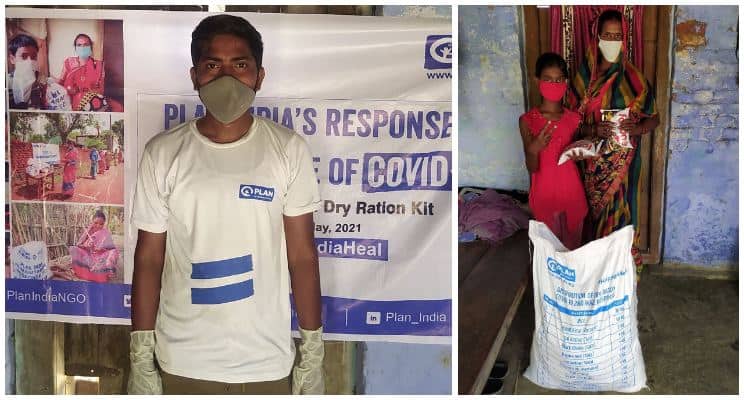
Bishnupur and its life in COVID-19
If you google “Bishnupur village” you would find many villages across India with this name, but today I will be taking you on a journey to Bishunpur village in Saran district of Bihar. Plan India has been working with the village community for more than 12 years, and after the COVID pandemic many families in the village are constantly seeking awareness, guidance and support to tide over the challenge. Due to the COVID restrictions in the state, this beautiful village hardly had any person walking its dusty roads when Satyendra and Deepak, Plan India’s frontline workers reach this village to spread awareness on COVID appropriate behaviour and extend food aid for the COVID affected poor and vulnerable families.
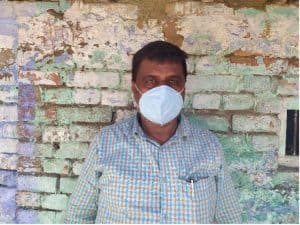
Satyandra, Programme Unit Coordinator
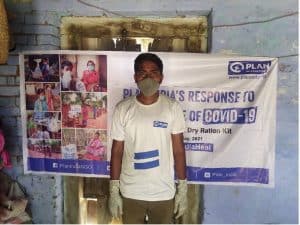
Deepak, Plan India’s frontline worker
Plan India’s first-hand pandemic experience
As they reach the distribution site, it was already noon and extensively humid. Covered with face shield, masks and gloves, they somehow manage to wipe the sweat from their forehead. They are taking extra precaution as 55 villagers have been infected with COVID, while some have recovered there are still few active cases. For the past few days, they have been visiting villages and distributing nutritional dry food kit which contains a sizeable quantity of rice, wheat, pulses, cooking oil as well as protein powder among others.
Given the unprecedented surge in COVID cases and its adverse impact on the poorest of the poor families, Plan India, as part of its humanitarian mandate, immediately set up an aid drive wherein 100,000 COVID infected and affected families will be provided food and nutrition baskets. The reach of this project covers Plan India’s programme areas in 30 districts spread across 8 States.
When Plan India met Rachna – a Bishnupur resident mother!
As Satyendra and Deepak patiently wait, 35 year-old Rachna rustles in with her 11 year-old daughter Pooja Kumari. A smile lits on her face when she is handed over the nutritional food basket by the Plan India team, comprising of dry rations for a family of five members to last some 30 days. Pooja who had her ludo board game clutched in her hands drops it and tries to pry into the box. While gently chiding her, Rachna shares that since schools have been shut down, “it is becoming difficult to keep the children occupied. So much of energy and no outlet to be spent.”
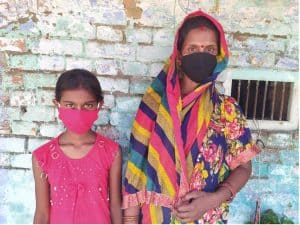
Rachna and Pooja Kumari
Rachna was diagnosed as COVID positive three weeks back. Few days ago she did an antigen test, and it came out negative. She gives credit to the measures that she and her family undertook– maintaining isolation, taking medicines including homemade ones and praying to their deity.
“It was really tough but I was able to isolate myself from my family members. I suffered mild symptoms of fever and cold,” remembers Rachna. “More than the discomfort from COVID, we were surprised to be see how our neighbours shunned us. Even today when my reports have come out negative, they are avoiding us. Even if they visit us, they avoid drinking or eating our food. There is a new discrimination that we are seeing,” rues Rachna. While the adults were in conversation, Pooja comments “My friends did not want to play with me.” Upon being asked the reasons – she responds solemnly, “Maa had COVID.”
Is COVID-19 stigma and vaccine hesitancy real?
COVID stigmatisation and vaccine hesitancy is a common prevalence seen across the country. Plan India is tackling this issue through advocacy while also encouraging people to get vaccinated and adopt COVID appropriate behaviour as part of their daily life. “Continuous efforts are required since misinformation from the local news agencies and social media is deeply entrenched,” shared Satyendra.
Hope – the key to survival
When Rachna opens the dry ration kit, the smile is back on her face. She tallies the item as it not only means easy availability of food but also a saving of INR 3000-3500 from her household expenses. A respite as her husband – a daily wage earner, has been unable to get regular work for the past few months.
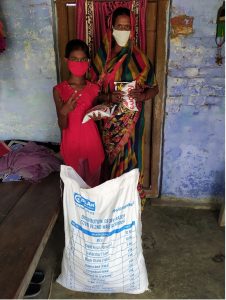
Rachna and Pooja Kumari
Satyendra, Plan India team leader responsible for coordinating the humanitarian and development work in the district, goes on to explain that due to COVID there has been a tremendous loss of livelihoods impacting adversely the income of the villagers who are largely daily wage earners. This problem is further compounded as they face competition from the labourers who have returned to their village from cities such as Delhi, Mumbai and Gujarat. With no jobs around and dwindling incomes, most of these families are surviving by borrowing money often from the local money lender at 5% interest rate which is much higher than normal times. However, a sense of optimism and hope still prevails for better times once the COVID situation is normalised.
#HelpIndiaHeal can and is making a difference
Under the #Helpindiaheal project, as on 1st June 2021, Plan India has reached out to 18,695 people with Nutritional Food Kit, facilitated the vaccine registration of 63,440 people onto the Government app and portal, and supported 18,054 people to get their first jab and 4,691 their second. It has also directly sensitised 1,73,863 on COVID appropriate behaviour and vaccination.
Written By
Pinky Pradhan, Director – Communications and Strategic Partnerships






 Admin Planindia
Admin Planindia June 17 2021
June 17 2021 #HelpIndiaHeal,
#HelpIndiaHeal, 